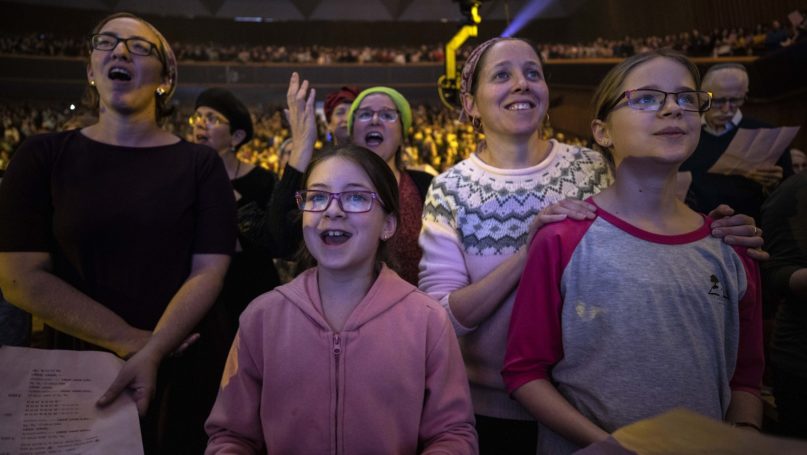JERUSALEM (AP) — As Orthodox Jews worldwide conclude a grueling marathon of daily Talmud study, a growing number of Israeli women have joined the effort, spotlighting collapsing gender barriers in the male-dominated community.
Over the past week, Jews around the world have celebrated the end of a 7 1/2-year cycle of daily study of the Talmud, with assemblies from Jerusalem to London to New York.
The Babylonian Talmud is a vast, rambling text written mostly in Aramaic that encompasses law codes, anecdotes, mysticism, customs, disputations and aphorisms, and serves as the cornerstone of Orthodox Jewish practices. The 63-volume, 2,711-page compendium of Jewish law — compiled in Mesopotamia in the 5th century AD — takes seven years and five months to finish at a rate of a single page per day.
The custom, known as “Daf Yomi,” Hebrew for “daily page,” began in 1923, when Polish Rabbi Meir Shapiro conceived of the idea with the aim of uniting Jews globally in a daily regimen of Talmud study. Everyone participating would quite literally be on the same page in learning the complexities of Jewish law.
This year, Agudath Israel of America, an Orthodox Jewish organization, rented out the MetLife Stadium and Brooklyn’s Barclays Center for the festivities in New York. Attendance has skyrocketed in recent decades, from a few hundred in 1960, to over 92,000 on New Year’s Day, according to organizers. The overwhelming majority were men.
Similar celebrations marking the “Siyyum Shas,” or completion of the study cycle, took place across Israel, also dominated by Orthodox men garbed in traditional black and white clothing.
But in a sign of the changing times, over 3,000 people joined a celebration in Jerusalem overwhelmingly attended by women dressed in a kaleidoscope of colors.
Michelle Cohen Farber, co-founder of Hadran, the organization behind Sunday’s event, said her 7 1/2-year undertaking began with launching a daily Talmud class in her hometown of Raanana in central Israel.
“You have to be a little crazy to do Daf Yomi every day,” Cohen Farber said. Despite the challenge, she and a group of around a dozen dedicated women went the distance. Along the way, Cohen Farber launched a podcast, “Daf Yomi for Women,” to bring her lessons to a broader audience, and in 2018 she helped co-found Hadran to promote Talmud study among Jewish women.
Orthodoxy does not prevent women from Talmud study, but it has long limited leadership roles for women, unlike the more liberal Reform and Conservative streams of Judaism which have embraced female rabbis.
Those limits have often discouraged women from intensive study. But attitudes are changing, and technology has played a big part. There are study groups for women on Facebook, podcasts, Daf Yomi websites, and Sefaria — a comprehensive digital Jewish library with English translation — that have helped make Talmud study far more accessible to women across the Jewish world.
Organizers said that 3,300 people attended the fully booked event at Jerusalem’s International Convention Center. The festivities reached their crescendo with a prayer marking the completion of the entire Talmud. The emcee asked all those who had studied the entirety of the text to stand, and one by one dozens of women scattered in the auditorium rose to thunderous applause. A handful more were wrapping up a second, third or fourth cycle of the Talmud.
“The goal of the big event isn’t so much our celebrating that we’re finishing Shas,” Cohen Farber said, using the Hebrew acronym for the Talmud. “It’s to share our contagious love of learning with the rest of the world and and to say you can do this, too.”
Women’s participation in these Daf Yomi events remains a small percentage of the overall participants, but organizers of the event in Jerusalem hope it will encourage more Jewish women to engage in an area of study long dominated by men.
“I think that we’re seeing incrementally a lot of change and a lot of that is due to the fact that women are more educated and they’re choosing to take their learning to the next level of seriousness,” said Erica Brown, director of the Mayberg Center for Jewish Education and Leadership at George Washington University.
Brown said that increasingly there are a growing number of women serving as school principals, community educators and legal authorities in the Orthodox world. A rare few have emerged as congregational leaders at progressive Orthodox synagogues.
At Midreshet Lindenbaum, a progressive Orthodox seminary in Jerusalem, women are learning to serve as legal experts in religious courts and fill other theological niches that Orthodoxy permits.
Rabbi Kenneth Brander, president and head of the Ohr Torah Stone network of Jewish institutions, which includes Lindenbaum, said that “20 years ago, the people who taught Talmud to the women were men.” Today, he said, “the amount of women who are teaching it is exponentially greater.”
Although women have traditionally not led Orthodox services, “partnership minyans” have begun to take root in Israel and the U.S. These services allow women to participate within the limits of Orthodox religious law, leading parts of prayer services or reading from the Torah. Brander said mainstream Orthodoxy is in the “embryonic stages” of embracing female theologians.
For Cohen Farber, Jewish women being engaged with the Talmud will only push that envelope further for the Orthodox world.
“On a very basic level, I just think women will be taken more seriously in communities,” Cohen Farber said. “The more educated women are, the more they’ll be part of the conversation.”





